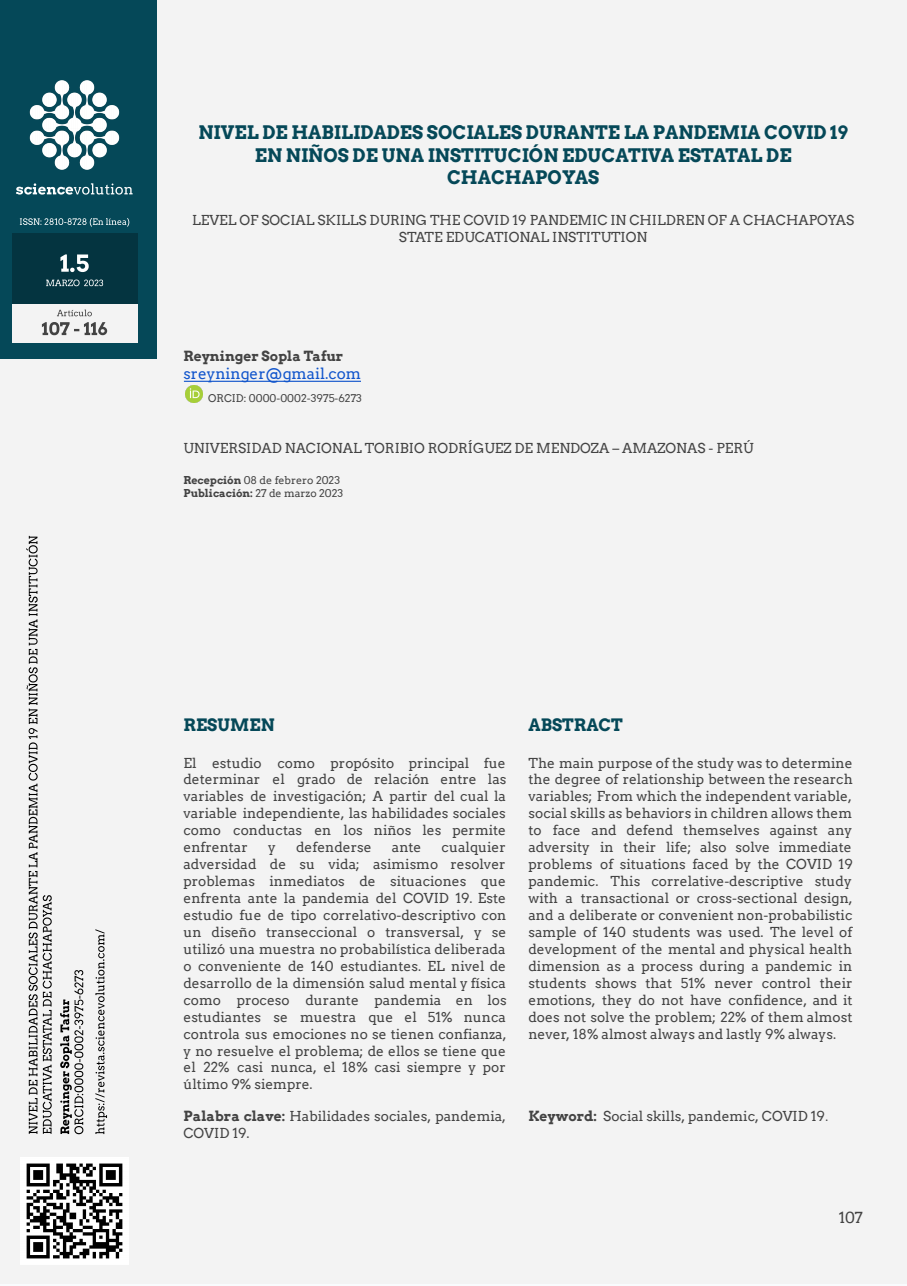Abstract
The main purpose of the study was to determine the degree of relationship between the research variables; From which the independent variable, social skills as behaviors in children allows them to face and defend themselves against any adversity in their life; also solve immediate problems of situations faced by the COVID 19 pandemic. This correlative-descriptive study with a transactional or cross-sectional design, and a deliberate or convenient non-probabilistic sample of 140 students was used. The level of development of the mental and physical health dimension as a process during a pandemic in students shows that 51% never control their emotions, they do not have confidence, and it does not solve the problem; 22% of them almost never, 18% almost always and lastly 9% always.
References
Balluerka, L. (2020) Características de una comunidad resiliente ante los desastres. Recuperado: http://www.benfieldhrc. org/disaster_studies/projects/communitydrrindicators/comunity_drr_indicators_index.htm.Consultado 14.11.2009
Brooks, S. et al. (2020) The psychological impact of quarantine and how to reduce it: Rapid review of the evidence. The Lancet, 395(10227), 912-920. doi:10.1016/S0140-6736(20)30460-8
CEPAL/UNICEF (2020) Impacto de la Pandemia COVID-19 en las familias con niños, niñas y adolescentes. Buenos Aires: UNICEF
Calleja, D. (2016) Effective Social and Emotional Learning Programs-Middle and High School Edition. Recuperado el 17 de noviembre de 2016, de: http://www.casel.org/middle-and-high-school-edition-casel-guide/
Espada, J. et al., (2020) Buenas prácticas en la atención psicológica infantojuvenil ante la COVID-19. Clínica y Salud. Avance online. doi:10.5093/clysa2020a14
Hernández, R. F. (2014). Metodología de la investigación (6 ed.). Jalisco: Mc Graw Hill Education
Huarcaya, J. (2020) Consideraciones sobre la salud mental en la pandemia de COVID-19. (Tesis posgrado) Universidad de San Martín de Porres. Lima.Perú
Jiménez, D. (2020) resiliencia en adolescentes y jóvenes del programa de formación y empleo de la fundación Forge Lima Norte. (Tesis de posgrado) Universidad Nacional Federico Villareal. Lima. Perú.
Kelly, T. (2017) Elementos para el Diseño de Técnicas de Investigación: Una Propuesta de Definiciones y Procedimientos en la Investigación Científica. Tiempo de Educar.
León, R. et al. (2018) Las habilidades socioemocionales, no cognitivas o “blandas”: aproximaciones a su evaluación. Revista Digital Universitaria (RDU). Vol. 19, núm. 6 noviembre-diciembre. DOI: http://doi.org/10.22201/ codeic.16076079e.2018.v19n6.a5.
OMS (2020) World Health Organization. Global Surveillance for human infection with coronavirus disease (COVID-19). InterimGuidance. Suiza: Recuperado: https://www.who.int/publicationsdetail/global-surveillance-for-human-infection- with-novel-coronavirus-(2019-ncov
Organización Mundial de la Salud (OMS; 2020). Coronavirus (COVID-19). Recuperado: https://covid19.who.int/
Orgilés, M. et al., (2020) immediate psychological effects of the COVID-19 quarantine in youth from Italy and Spain. Recuperado: https://psyarxiv.com/5bpfz/
Otero, F. (2017) competencia socio emocional del maestro en relación al estudiante y los resultados del aula”, Revista de Investigación Educativa.
PRONABEC (2020) institución del Ministerio de Educación del Perú. COVID-19 en el Perú. MINEDU: SIBEC
Páez, G., Fernández, R. y Martín, D. (2016) Impacto de la epidemia del Coronavirus (COVID-19) en la salud mental del personal de salud y en la población general de China. Rev Neuro psiquiatr. Recuperado:: http://www.scielo.org.pe/scielo.php?pid=S0034-85972020000100051&script=sci_arttext
Ramírez, J. et al. (2020) consecuencias de la pandemia COVID 19 en la salud mental asociadas al aislamiento social. (Tesis de posgrado) Universidad Nacional de Colombia.
Reyes, I. (2020) efecto psicosocial del COVID-19. (Tesis posgrado) Universidad de Santiago de Cuba.
RAE, Real Academia de la Lengua Española. (2017) Diccionario de la Lengua Española. RAE. https://dle.rae.es
Reinoso, J. (2014) “Aprendizaje académico y socioemocional”, Academia Internacional de Educación. Revista de Investigación Educativa
Sun, L. et al., (2020) Prevalence and risk factors of acute posttraumatic stress symptoms during the COVID-19 outbreak in Wuhan, China. doi:10.1101/2020.03.06.20032425
Rojas. J. (2020) Inteligencia emocional y habilidades sociales en estudiantes de secundaria en la Institución Educativa Julio C. Tello – Ate. (Tesis posgrado) Universidad César Vallejo. Lima Perú.
Wang, C. Pan, R. et al. (2020) Immediate psychological responses and associated factors during the initial stage of the 2019 Coronavirus disease (COVID-19) epidemic among the general population in China. International Journal of Environmental Research and Public Health, 17(5), 1729. doi:10.3390/ijerph17051729

This work is licensed under a Creative Commons Attribution-NonCommercial-NoDerivatives 4.0 International License.
Copyright (c) 2023 http://revista.sciencevolution.com/

